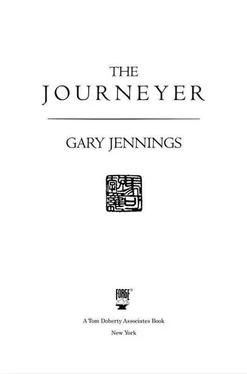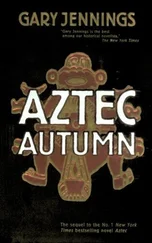“We could not have done much about it, if we had,” said my father. “The question is: what do we do now about Kukachin?”
I said, “Well, there is no Arghun waiting for her. And they told me ashore that his son Ghazan is still under age to succeed to the Khanate.”
“That is correct,” said Uladai. “I suppose his Uncle Kaikhadu is ruling as Regent in the meantime.”
“So they say. And either this Kaikhadu knew nothing of his late brother’s having sent for a new wife, or he is not at all interested in exercising any levirate right to take her for himself. Anyway, he has sent no embassy to meet her and no transport for her.”
“No matter,” said Uladai. “She comes from his Lord Khakhan, so he is obliged to relieve you of her care and take her into his own. We shall take her to the capital at Maragheh. As for transportation, you carry the Khakhan’s pai-tzu. We have only to command the Shah of Hormuz to supply us with everything we require.”
And that is what we did. The local Shah received us not just dutifully but hospitably, and lodged us all in his palace—though we filled it nearly to bursting—while he assembled all his own camels and probably every other one within his domain, and loaded them with provisions and water bags, and marshaled camel-pullers for them, and also troops of his own to augment ours, and in a few days we were journeying overland, northwest toward Maragheh.
It was a traverse as long as the one my father and uncle and myself had previously made across Persia from west to east. But this time, going south to north, we had no very terrible terrain to cross, for our route took us well west of the Great Salt Desert, and we had good riding camels and copious supplies, and plenty of attendants to do every bit of work for us, and a formidable guard against any possible molesters. So it was a fairly comfortable trip, if not a very merry one. The Lady Kukachin did not wear any of the bridal finery she had brought, but every day wore brown, the Persian color of mourning, and on her pretty face wore a look that was partly apprehensive of what her fate might now be, and partly resigned to it. Since all the rest of us had got very fond of her, we worried with her, but did everything we could to make the journey easy and interesting for her.
Our route did take us through a number of places where I or my father or my uncle—or all of us together—had been before, so my father and I were constantly looking to see what changes, if any, had occurred in the years since then. Most of our stops along the way were only for a night’s sleep, but when we got to Kashan, my father and I commanded an extra day’s stay, so we could stroll about that city where we had rested before our plunge into the forbidding Dasht-e-Kavir. We led Uncle Mafìo walking with us, in a sort of meager hope that those scenes of long ago might jar him back to a semblance of what he had been long ago. But nothing in Kashan woke any glimmer in his dulled eyes, not even the “prezioni” boys and young men who were still the city’s most visible asset.
We went to the house and stable where the kindly Widow Esther had given us lodging. The place was now in the possession of a man, a nephew who had inherited it years ago, he said, when that good lady died. He showed us where she was buried—not in any Jewish, cemetery but, at her own deathbed insistence, in the herb garden behind her own abode. That was where I had watched her pounding scorpions with her slipper, while she exhorted me never to neglect any opportunity to “taste everything in this world.”
My father respectfully crossed himself, and then went on along the street, leading Uncle Mafìo, to go and look again at Kashan’s kashi-tile workshops, the which had inspired him to set up the same in Kithai, and from which our Compagnia had realized such handsome profits. But I stayed on with the widow’s nephew for a while, looking pensively down at her herb-grown grave and saying (but not aloud) :
“I followed your advice, Mirza Esther. I let no chance go by untaken. I never hesitated to follow where my curiosity beckoned. I willingly went where there was danger in beauty and beauty in danger. As you foretold, I had experiences in plenty. Many were enjoyable, some were instructive, a few I would rather have missed. But I had them, and I have them still in memory. If, as soon as tomorrow, I go to my grave, it will be no black and silent hole. I can paint the darkness with vivid colors, and fill it with music both martial and languorous, with the flicker of swords and the flutter of kisses, with flavors and excitements and sensations, with the fragrance of a field of clover that has been warmed in the sun and then washed by a gentle rain, the sweetest-scented thing God ever put on this earth. Yes, I can enliven eternity. Others may have to endure it; I can enjoy it. For that I thank you, Mirza Esther, and I would wish you shalom … but I think that you, too, would not be happy in an eternity of nothing but peace … .”
A black Kashan scorpion came scrabbling along the garden path, and I stepped on it for her. Then I turned to the nephew and said, “Your aunt once had a house maid named Sitarè …”
“Another of her deathbed dispositions. Every old woman is a matchmaker at heart. She found for Sitarè a husband, and had them married in this house before she died. Neb Efendi was a cobbler, a good craftsman and a good man, though a Muslim. He was also an immigrant Turki, which made him not very popular hereabout. But it also made him not a pursuer of boys, and I trust he was a good husband to Sitarè.”
“Was?”
“They moved away from here shortly afterward. He was a foreigner, and evidently folk prefer to have their shoes made and mended by their home folk, even if they are inept in their work. So Neb Efendi picked up his awls and his lasts and his new wife and departed—to his native Cappadocia, I believe. I hope they are happy there. It was a long time ago.”
Well, I was a little disappointed not to get to see Sitarè again, but only a little. She would be a matron now, of about my own middle age, and to see her might be even more of a disappointment.
So we pushed on, and eventually arrived at Maragheh. The Regent Kaikhadu did receive us, not grudgingly but not with wild enthusiasm either. He was a typical, shaggy Mongol man at arms, who clearly would have been more comfortable astride a horse, hacking with a blade at some battlefield opponent, than he was on the throne to which his brother’s death had shoved him.
“I truly did not know of Arghun’s embassy to the Khakhan,” he told us, “or you may be sure I would have had you escorted hither in great pomp and ceremony, for I am a devoted subject of the Khakhan. Indeed, it is because I have spent all my time afield, fighting the Khanate’s campaigns, that I was unaware of Arghun’s canvass for a new wife. Right this minute, I should properly be putting down a band of brigands that are rampaging over in Kurdistan. Anyway, I do not know quite what to do with this woman you have brought.”
“She is a handsome one, Lord Kaikhadu,” said the envoy Uladai. “And a good-natured one.”
“Yes, yes. But I already have wives—Mongol, Persian, Circassian, even one frightful Armeniyan—in yurtus scattered from Hormuz to Azerbaizhan.” He threw up his hands distractedly. “Well, I suppose I can inquire among my nobles … .”
“We will stay,” my father said firmly, “until we see the Lady Kukachin settled according to her station.”
But the lady took care of that herself, before we had been many days in residence at the Maragheh palace. My father and I were airing Uncle Mafìo in a rose garden one afternoon when she came running up to us, smiling for the first time since our arrival at Hormuz. She also had someone in tow: a boy, very short and ugly and pimply, but in courtier’s rich attire.
Читать дальше












